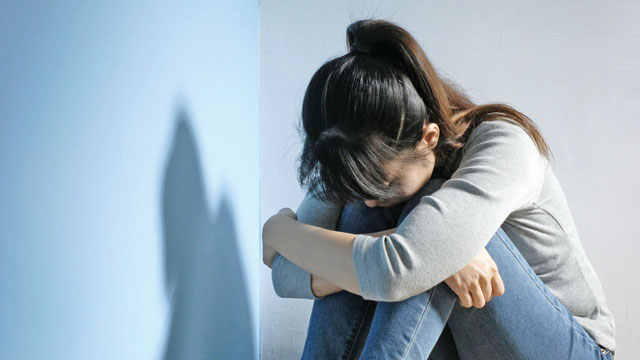
By Bernadette Doran, RMT –
We all get bouts of sadness now and then. But, one in seven Americans tumbles into the black hole of clinical depression—deep, sustained despondency accompanied by many different symptoms, including chronic fatigue, loss of pleasure in normal activities, sleep disruption, frequent crying, feelings of worthlessness and helplessness, and feelings of pessimism and hopelessness. Depression can also manifest as irritability, aches or pains that won’t go away, especially headaches and stomach aches, a persistent sense of emptiness, and sometimes thoughts of suicide. Symptoms are complex and contradictory—one person may sleep all day while another is so agitated, she cannot sleep at all. If any combination of symptoms lasts more than two weeks, it can be the onset of clinical depression. Even though the condition may present itself in different ways, the results are always the same. Depression makes every day a sad, hopeless and debilitating struggle that affects every aspect of life from family and relationships to job performance.
What Causes Depression
The causes of depression are as varied as its symptoms. Some are well known, while others may surprise you.
Genetics: Someone who has a family history of depression will probably be at risk.
Defeated by Disease: People grappling with difficult health challenges, such as diabetes, multiple sclerosis, cancer may become depressed.
Life Trauma: One of the most pervasive causes of depression is trauma, including physical, mental or sexual abuse in childhood, or trauma later in life. Veterans with post-traumatic stress disorder, for example, often have clinical depression. The longer the trauma is not addressed or treated, the longer depression will continue.
Community Violence: Fear of danger and death for yourself and loved ones can cause depression.
Gender Identity: Long-term struggles with gender identity and lack of support are factors as well.
Now to some surprising causes; you might want to skip that donut and check the warnings on your birth control pills.
Fast Food and Commercial Baked Goods: A 2012 study in the UK’s Public Health Nutrition Journal found that people who consumed those foods were 51% more likely to develop depression compared to those who did not. However, there are other possible contributing factors. Those same people were more likely to be single, less active, have poor dietary habits and work long hours.
Combining Meds: Taking multiple common medications at the same time was found to cause depression. A study of medication use patterns of more than 26,000 adults discovered that 200 commonly used prescription drugs, including hormonal birth control pills, blood pressure and heart medications, proton pump inhibitors, antacids and painkillers, have depression or suicide listed as potential side effects. About 15% of adults who simultaneously used three or more of these medications experienced depression while taking the drugs, compared with just 5% for those not using any of the drugs, 7% for those using one medication and 9% for those taking two drugs simultaneously. More than one-third of U.S. adults may be using prescription medications that have the potential to cause depression or increase the risk of suicide.
Facebook: Researchers at the University of Missouri have found that Facebook can lead to depression when viewers compare their lives to those of their friends. Users who feel envious after seeing postings about expensive vacations, new houses or cars, or happy relationships are much more likely to report feelings of depression than those who feel happy for their friends.
Too Much Screen Time: The suicide rate for girls aged 13 to 18 increased by 65% between 2010 and 2015. The number of girls experiencing suicide-related outcomes such as feeling hopeless, thinking about suicide, planning for suicide or attempting suicide rose by 12%. The number of teenage girls reporting symptoms of severe depression increased by 58% during that period. San Diego State University researchers discovered an important statistical correlation: 48% of teens who spent five or more hours per day on electronic devices reported at least one suicide-related outcome, compared to only 28% of those who spent less than an hour a day on devices.
The researchers asked teens how they spend their leisure time, and between 2010 and 2015, teens increasingly spent more time with screens and less time on other activities. “That was by far the largest change in their lives during this five-year period, and it’s not a good formula for mental health,” the study concluded.
What You Can Do
Drugs may or may not be an answer: More than half of the 41 million Americans who take antidepressants do not fully respond. Ironically, antidepressants may actually make things worse. A recent study showed that depressed people who use antidepressants are far more likely to suffer a relapse of major depression than those who avoid antidepressants altogether.
The great news is research has discovered many other approaches that offer significant help.
For Trauma-Based Depression: “While we can’t change a person’s family history or their life experiences, it is possible to help a person change the way they think and to teach them positive coping strategies,” says Professor Peter Kinderman. Kinderman is the Head of the Institute of Psychology, Health and Society, at the University of Liverpool in the UK, and has been researching successful cognitive therapy approaches. Therapies that access the subconscious, where traumatic memories are often deeply buried, can be especially helpful, including hypnosis, EFT, EMDR and Holographic Memory Resolution.
Sports and Physical Activity: Physical activity brings about neurobiological changes in the brain that are proven to relieve depression. Physical activity enhances the brain’s capacity to absorb serotonin, ensures the release of various factors for nerve growth, prevents cell death in the hippocampus (caused by depression) and reduces the stress hormone cortisol—all using your body’s own chemistry set instead of an invasive drug.
Get a Pet: Studies show that a whopping 74% of people with pets report mental health improvements from owning a pet. A pet provides you with a faithful companion, a confidante to tell your troubles to and a buddy to exercise with—all terrific for lifting depression.
Reiki: The successful long-term effects of Reiki were documented in a double-blind study of 55 adults suffering from depression and stress. After six weeks of treatment, a hands-on Reiki-treated group and a distant healing Reiki-treated group both showed significant improvement based on standard psychological measurement tests for depression. Even more important, the relief from depression lasted a full year after only six weekly Reiki treatments.
Yoga: In one study, 23 male veterans participated in twice-weekly yoga classes for eight weeks. On a 1-10 scale, the average enjoyment rating for the yoga classes for these veterans was 9.4. All participants said they would recommend the program to other veterans. More importantly, participants with elevated depression scores before the yoga program had a significant reduction in depression symptoms after the eight weeks.
Meditative Breathing: Sudarshan Kriya yoga helped alleviate severe depression in people who did not fully respond to antidepressant treatments, according to a study published in the Journal of Clinical Psychiatry. The meditation technique, which can be practiced in both a group setting and at home, includes a series of sequential, rhythm-specific breathing exercises that bring people into a deep, restful, and meditative state: slow and calm breaths alternated with fast and stimulating breaths. Participants showed significant relief from depression symptoms after a two-month course.
Probiotics: Twice as many adults with irritable bowel syndrome (IBS) reported improvements from co-existing depression when they took probiotics than adults with IBS who took a placebo, according to the journal, Gasteroentrology. Researchers say this study provides further evidence of the microbiota environment in the intestines being in direct communication with the brain to support mental health.
Even the most stubborn case of depression can be overcome, experts say, by taking one step at a time. Reaching out and staying connected, getting plenty of sunlight and exercise, picking up a former hobby you used to love, challenging negative thinking, eating healthy foods and seeking professional help can all be the crucial first step.
Bernadette Doran, RMT, is a trauma therapist and director of Equilibrium Energy + Education, a research-based energy medicine wellness center in Chicago’s South Loop. Go to www.equilibrium-e3.com or call 312-786-1882 for further details.
 Conscious Community Magazine Dedicated to Elevating Consciousness
Conscious Community Magazine Dedicated to Elevating Consciousness




